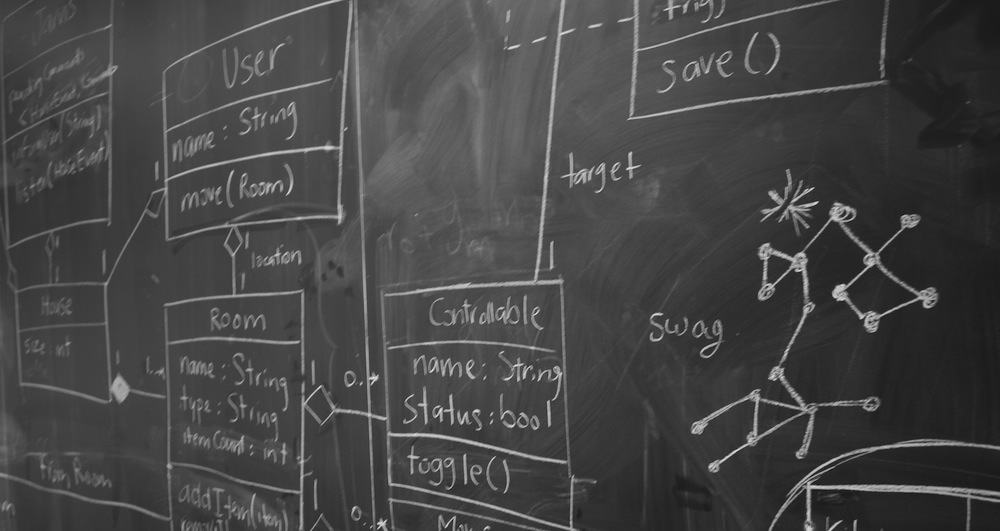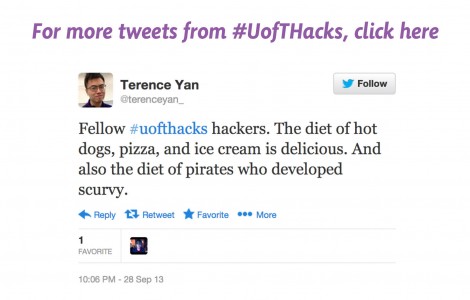Over 300 programmers camped out in the University of Toronto’s Bahen Centre for Information Technology on the September 28–29 weekend to participate in the Computer Science Student Union’s first-ever coding marathon, or “hackathon.” Participants, working either individually or as members of a team, were given 36 hours to design and code a unique project, and competed for prestigious prizes donated by the event’s sponsors.
On 11:30 pm on Friday evening, about 150 programmers have already arrived at Bahen; the rest will arrive early Saturday morning. The hackathon officially started at 9:30 pm, which means that these participants have already had a couple of hours to work on their projects. In some cases, this means learning a new language or software framework from scratch — no one here is afraid of tackling something unfamiliar and difficult.
Audun Bjørnurd Mo and Kamyar Ghasemipour, for instance, are both second-year computer science students at U of T. Neither has ever participated in a hackathon before and, like many participants, they’re relatively new to programming. In fact, Audun acknowledges that “the biggest hurdle for both of us is probably that we’re both lower-level students.” They met on arrival and decided to team up; after spending the last couple of hours brainstorming ideas, they think they have a project. Kamyar happened to bring along a Kinect — a motion sensor for Microsoft’s Xbox — and they came up with the idea of designing a website using voice and motion commands. Ideally, they will be able to stand in front of the motion sensor, tell the computer what they want on a webpage, point to where they want it, and then simply gesture with a hand to “stick” it to the webpage. It’s ambitious and they know it, especially since Kamyar is going to have to learn a new programming language in order to do it.
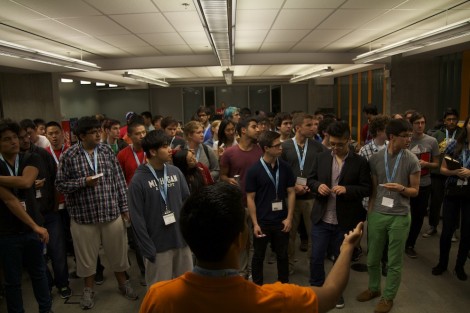
Over 300 programmers gathered for the hackathon at the Bahen Centre. TREVOR KOROLL/THE VARSITY
Meanwhile, Ben Cohen, a veteran of four hackathons, says the biggest challenge is always staying focused for such a long time. His solution: “Work on something interesting that you like… If it’s interesting, you’ll want to come back.”
His own project certainly qualifies. Ben attends the Rochester Institute of Technology, where one of the constituent colleges is the National Technical Institute for the Deaf. This means that about 10 per cent of the students on his campus are either deaf or hearing impaired. After three years at RIT, Ben has picked up the basics of American Sign Language (ASL), but many of his classmates haven’t. Although he has never worked with images before, he plans to create an app that will recognize and interpret finger spelling. The app will aid communication between the deaf community and the hearing community.
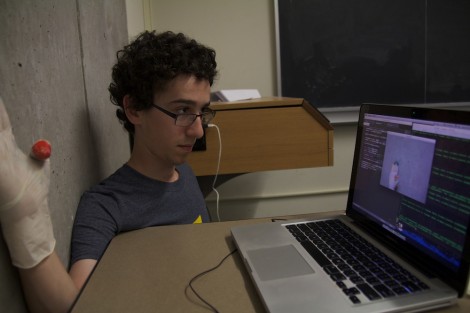
Ben Cohen works on his ASL to English translator. TREVOR KOROLL/THE VARSITY
After a full night of work, Saturday offers coders the chance to take a short break from their projects and drop by the tech expo, where they can meet with recruiters and mentors from leading companies, and attend a series of lectures. One of these lectures is a fascinating talk by lawyer Rosy Rumpal, a specialist in working with new start-ups, on the legal aspects of creating a new business. The tech expo is a great way for students to meet potential employers, as recruitment is one of the main reasons companies choose to sponsor an event like UofTHacks. As Jeff Shin, a design mentor for the competition and a representative of sponsor OneClass, says: “An event like this makes people stand out… There are a lot of students who really focus on school but don’t partake in extracurriculars… It really sets [the participants] apart.” Matt Helm, a Javascript developer from Shopify, the event’s biggest sponsor, confirms: “We want to find the top developers, even if they’re still in school.”
There is certainly no shortage of outstanding coding on display in the final Hack Expo on Sunday morning, or in the final presentations Sunday afternoon.
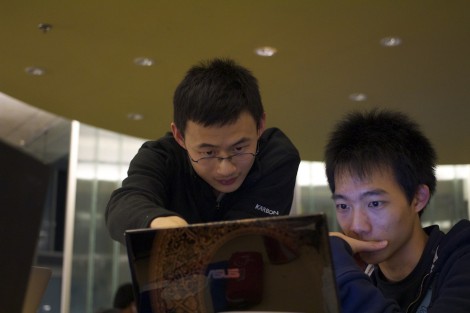
Two hackers work on their projects through the night. TREVOR KOROLL/THE VARSITY
There is Automatic ROSI, an app that will automatically check ROSI for you after waitlists have been removed. There is Dynamit, which will merge your entire online social life into one feed. NeatChore, created by five U of T exchange students from Brazil, keeps track of roommates’ or housemates’ chores and awards points to the most helpful contributors. There is Audun and Kamyar’s project, Kinect, which wins the prize for “Most Innovative Hack.” The two are overjoyed and astonished; 36 hours before, they could never have predicted this.
A panel of four judges determines the top three overall; individual sponsors have also offered specific category prizes. One of the most lauded projects is bananasundae.com, a website designed to help students find recipes quickly and easily based on the available ingredients. Type in the ingredients you have in your fridge, and Banana Sundae will promptly return a list of recipes that you can make with those ingredients — which can be sorted by popularity, price, and preparation time. The creators of the website, Will Lau and Vahe Khachikyan, walk away with no less than three separate prizes, including second place overall. Ben Cohen’s English to ASL translator places third, and the top prize goes to Cryptr, an app that will allow you to encrypt information or files and send them securely via email.
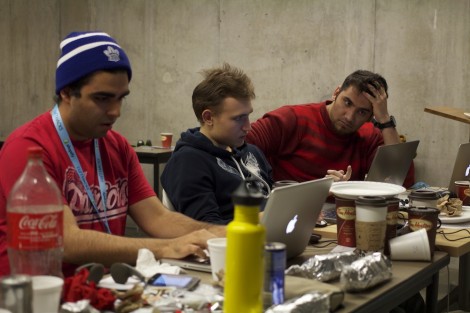
The hackathon laster 36 hours. TREVOR KOROLL/THE VARSITY
Each team shares one thing in common: they all have identified a specific need or a specific problem, and put all of their creativity, ingenuity, and perseverance towards creating a solution. It is not programming for the sake of programming. The projects of UofTHacks showcase the potential of code: the future of technology is in the hands of the hackers.

